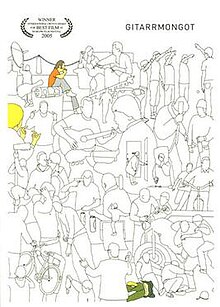The Guitar Mongoloid
| The Guitar Mongoloid | |
|---|---|
 Theatrical release poster | |
| Directed by | Ruben Östlund |
| Written by | Ruben Östlund |
| Produced by | Anna Sohlman Kalle Boman |
| Cinematography | Tibor Gent |
| Edited by | Harry Lewinsson |
| Distributed by | Triangelfilm AB |
Release date |
|
Running time | 89 minutes |
| Country | Sweden |
| Language | Swedish |
The Guitar Mongoloid (Swedish: Gitarrmongot) is a 2004 Swedish drama film directed by Ruben Östlund, about different people living outside the norms in the fictional city Jöteborg, strikingly similar to real-life Göteborg. Although not a documentary, most of the people seen in the film are non-actors more or less playing themselves.
Selected cast
- Erik Rutström as Erik
- Ola Sandstig as Ola
- Britt-Marie Andersson as neurotic woman
- Julia Persdotter as Ola's girlfriend
- P-A Emanuelsson
- Anna Johansson
- Mikael Allu
- Bjarne Gunnarsson
- Pär Berg
- David Olandersson
Reception
The film was met by mixed but overall positive reviews, with a rating of 3.6 out of 5 based on eight reviews at the Swedish-language review aggregator website Kritiker.se.[1] Carl-Johan Malmberg at Svenska Dagbladet gave it 5 out of 6 and called it "a series of sabotages: against our expectations, against good taste, as well as against the boredom of the normal Swedish film with its moderately thoughtful, moderately funny, moderately empathetic, and quickly forgotten stories."[2] Jens Peterson at Aftonbladet was less enthusiastic and rated the film 2 out of 5, summarising it as "Jackass without heart, Candid Camera without humour."[3][4] The film was honored with the FIPRESCI Award at the 27th Moscow International Film Festival.[5]
Controversy
The film was highly criticized for its offensive title by the Mongolian people and the international Down Syndrome community. Mongolian communities worldwide protested the film and asked the director change the film title and asked the movie theaters in the US and Canada to read out the following statement to the audience before each screening: "The term “mongoloid”, referring to people with Down syndrome, was dropped by the World Health Organization in 1965 because it was and still is considered to be offensive to those of Mongol ethnicity.
Dr. John Langdon Down, who discovered Down’s syndrome in the 1860s, used “mongolism” and “mongoloid” to describe the syndrome as he stated that there were similar physical characteristics of people with Down’s syndrome to people from Mongolia and Mongoloid race (those of Asian ethnicity). This phrase was used until the 1960s, when scientists petitioned to use “Down’s syndrome” instead of “Mongolism” or “Mongoloid”.
Furthermore, in many countries, the word has come to be used as a term of offense. There are many campaigns around the world trying to stop the hurtful and offensive usage of “mongoloid” and to promote the original meaning, namely, “related to the culture, language and people of Mongolia. We hope you choose not to use it in the future in derogatory context and educate others in its correct meaning."
The Director Ruben Ostlund himself said that he would have chosen a different name if he were to make the film again and that he might recommend changes in the title for future distribution.
Moreover, theaters in the US and Canada edited the film description on their websites accordingly. http://www.ybca.org/mongol-and-mongoloid-strange-history-words BBC World Services covered the issue in March, 2015. goo.gl/W7NtQP
References
- ^ The Guitar Mongoloid (in Swedish). Kritiker.se. Retrieved on 2009-04-14
- ^ Malmberg, Carl-Johan (2004-10-01) "En debut vi väntat på" (in Swedish). Svenska Dagbladet. Retrieved on 2009-04-14.
- ^ Peterson, Jens (2004-10-01) "Recensioner: Gitarrmongot" (in Swedish). Aftonbladet. Retrieved on 2009-04-14.
- ^ "27th Moscow International Film Festival (2005)". MIFF. Retrieved 2013-04-09.
- ^ Awards 2005. FIPRESCI. Retrieved on 2009-07-26.
